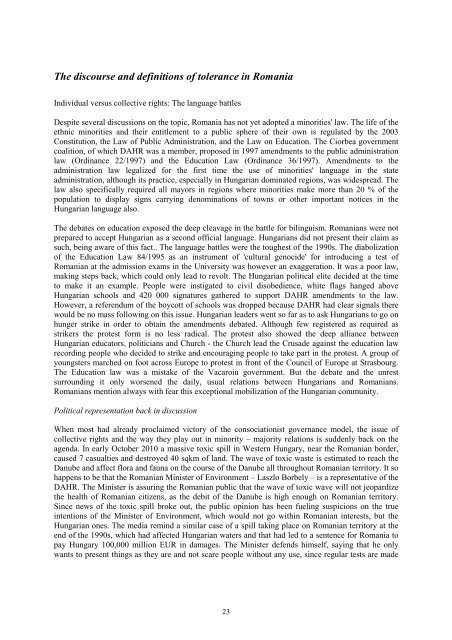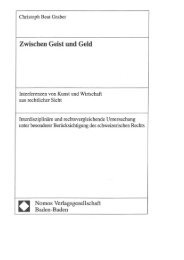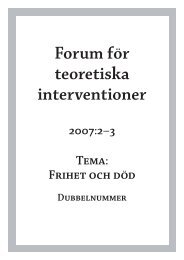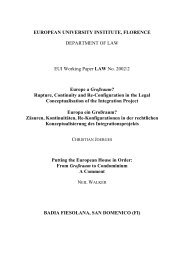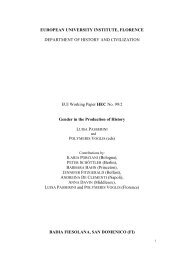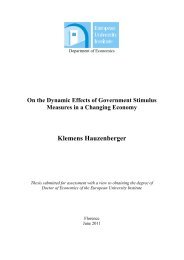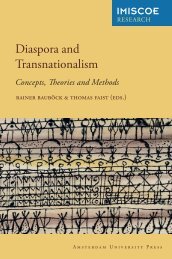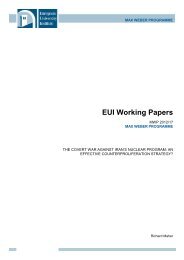Sinziana-Elena Poiana Ioana Lupea Irina-Madalina Doroftei Alina ...
Sinziana-Elena Poiana Ioana Lupea Irina-Madalina Doroftei Alina ...
Sinziana-Elena Poiana Ioana Lupea Irina-Madalina Doroftei Alina ...
You also want an ePaper? Increase the reach of your titles
YUMPU automatically turns print PDFs into web optimized ePapers that Google loves.
The discourse and definitions of tolerance in Romania<br />
Individual versus collective rights: The language battles<br />
Despite several discussions on the topic, Romania has not yet adopted a minorities' law. The life of the<br />
ethnic minorities and their entitlement to a public sphere of their own is regulated by the 2003<br />
Constitution, the Law of Public Administration, and the Law on Education. The Ciorbea government<br />
coalition, of which DAHR was a member, proposed in 1997 amendments to the public administration<br />
law (Ordinance 22/1997) and the Education Law (Ordinance 36/1997). Amendments to the<br />
administration law legalized for the first time the use of minorities' language in the state<br />
administration, although its practice, especially in Hungarian dominated regions, was widespread. The<br />
law also specifically required all mayors in regions where minorities make more than 20 % of the<br />
population to display signs carrying denominations of towns or other important notices in the<br />
Hungarian language also.<br />
The debates on education exposed the deep cleavage in the battle for bilinguism. Romanians were not<br />
prepared to accept Hungarian as a second official language. Hungarians did not present their claim as<br />
such, being aware of this fact.. The language battles were the toughest of the 1990s. The diabolization<br />
of the Education Law 84/1995 as an instrument of 'cultural genocide' for introducing a test of<br />
Romanian at the admission exams in the University was however an exaggeration. It was a poor law,<br />
making steps back, which could only lead to revolt. The Hungarian political elite decided at the time<br />
to make it an example. People were instigated to civil disobedience, white flags hanged above<br />
Hungarian schools and 420 000 signatures gathered to support DAHR amendments to the law.<br />
However, a referendum of the boycott of schools was dropped because DAHR had clear signals there<br />
would be no mass following on this issue. Hungarian leaders went so far as to ask Hungarians to go on<br />
hunger strike in order to obtain the amendments debated. Although few registered as required as<br />
strikers the protest form is no less radical. The protest also showed the deep alliance between<br />
Hungarian educators, politicians and Church - the Church lead the Crusade against the education law<br />
recording people who decided to strike and encouraging people to take part in the protest. A group of<br />
youngsters marched on foot across Europe to protest in front of the Council of Europe at Strasbourg.<br />
The Education law was a mistake of the Vacaroiu government. But the debate and the unrest<br />
surrounding it only worsened the daily, usual relations between Hungarians and Romanians.<br />
Romanians mention always with fear this exceptional mobilization of the Hungarian community.<br />
Political representation back in discussion<br />
When most had already proclaimed victory of the consociationist governance model, the issue of<br />
collective rights and the way they play out in minority – majority relations is suddenly back on the<br />
agenda. In early October 2010 a massive toxic spill in Western Hungary, near the Romanian border,<br />
caused 7 casualties and destroyed 40 sqkm of land. The wave of toxic waste is estimated to reach the<br />
Danube and affect flora and fauna on the course of the Danube all throughout Romanian territory. It so<br />
happens to be that the Romanian Minister of Environment – Laszlo Borbely – is a representative of the<br />
DAHR. The Minister is assuring the Romanian public that the wave of toxic wave will not jeopardize<br />
the health of Romanian citizens, as the debit of the Danube is high enough on Romanian territory.<br />
Since news of the toxic spill broke out, the public opinion has been fueling suspicions on the true<br />
intentions of the Minister of Environment, which would not go within Romanian interests, but the<br />
Hungarian ones. The media remind a similar case of a spill taking place on Romanian territory at the<br />
end of the 1990s, which had affected Hungarian waters and that had led to a sentence for Romania to<br />
pay Hungary 100,000 million EUR in damages. The Minister defends himself, saying that he only<br />
wants to present things as they are and not scare people without any use, since regular tests are made<br />
23


